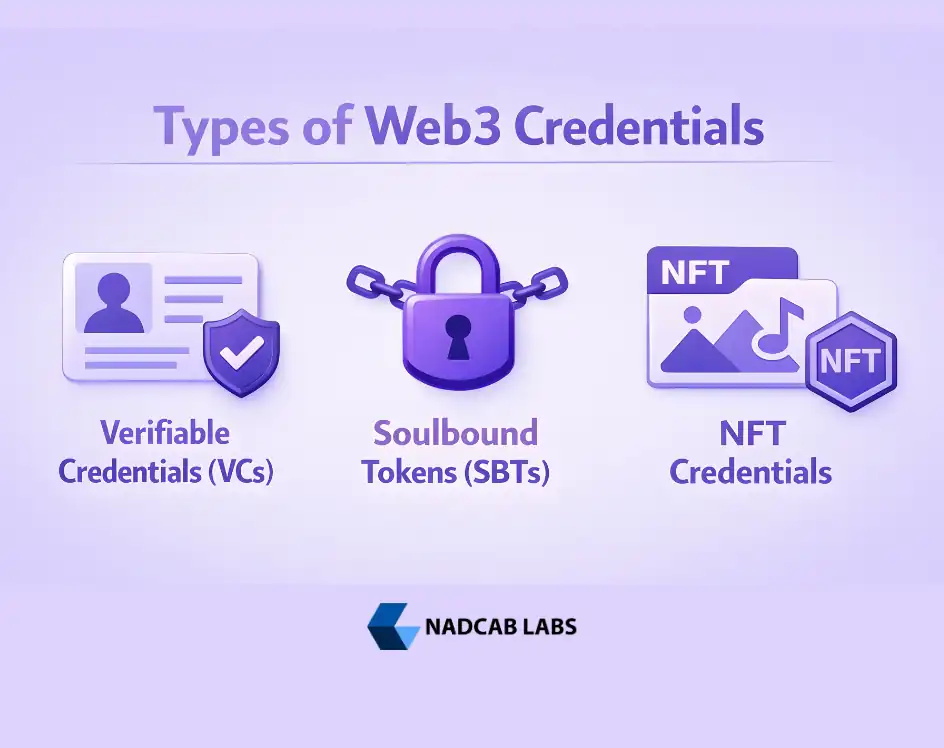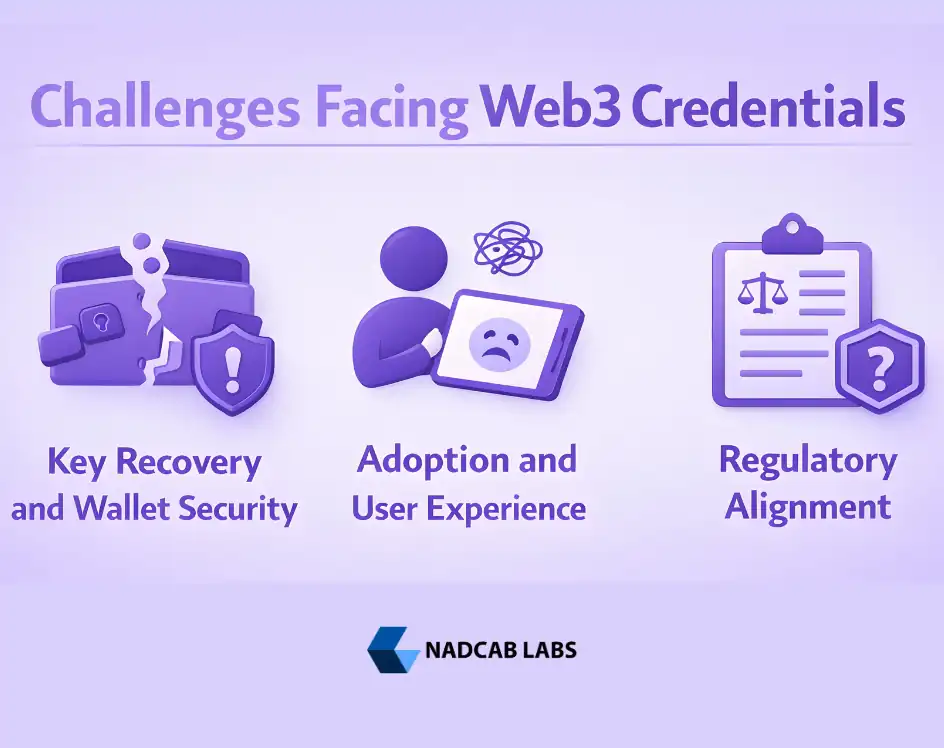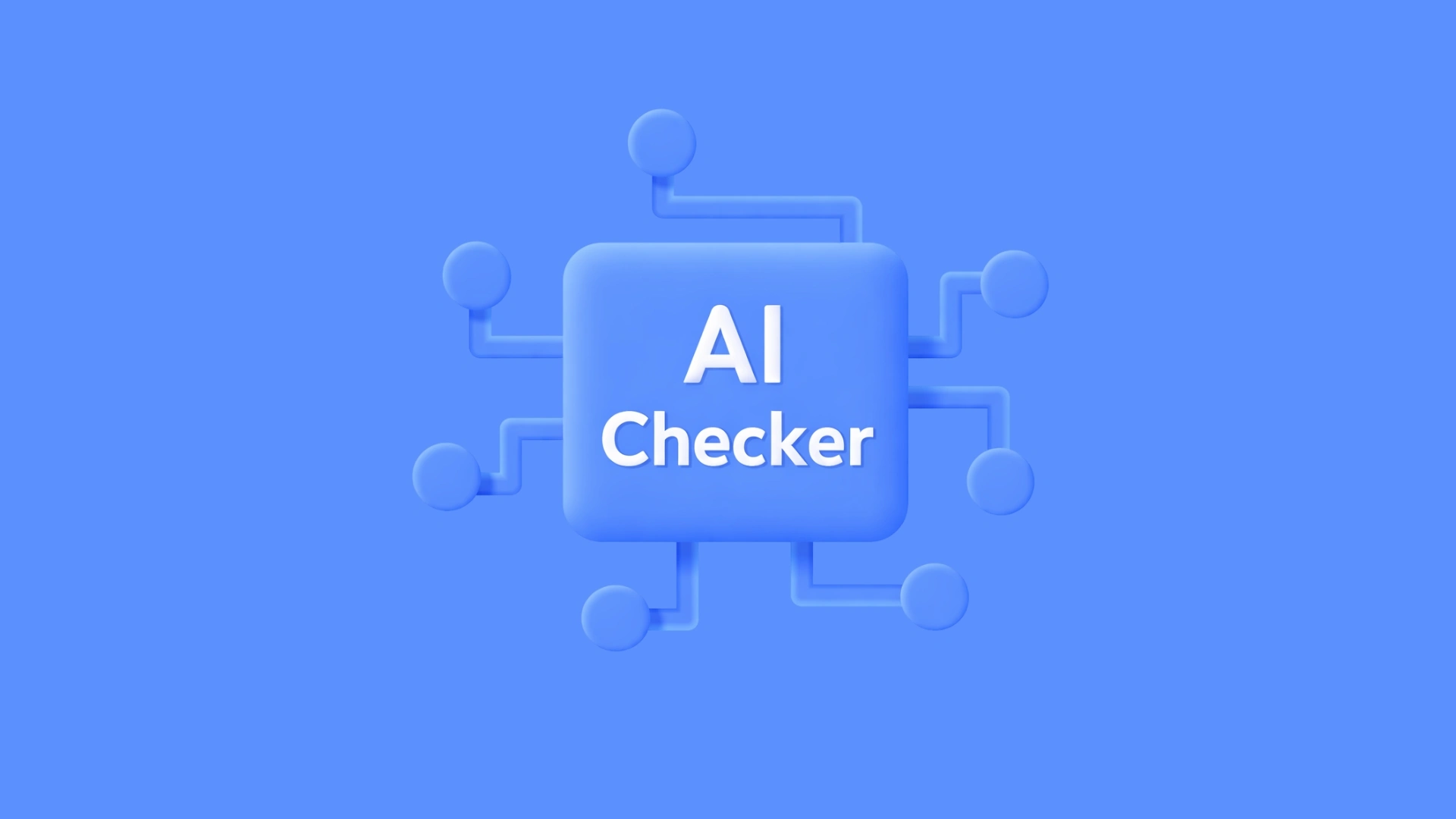Web3 credentials are changing how we prove who we are and what we have achieved in the digital world. Instead of relying on centralized databases controlled by companies or governments, decentralized credentials put users in control of their own identity data. This shift represents a fundamental change in how trust works online. Whether you are a developer building decentralized applications, a business exploring blockchain-based verification, or simply curious about the future of digital identity, understanding Web3 digital credentials is becoming essential in 2025 and beyond.[1]
Key Takeaways
- User Control: Web3 credentials let individuals own and manage their identity data without depending on centralized platforms.
- Tamper-Proof Security: Blockchain-based credentials use cryptographic signatures that make forgery virtually impossible.
- Instant Verification: Verifiers can authenticate credentials in seconds without contacting the original issuer.
- Privacy Protection: Zero-knowledge proofs allow users to prove facts about themselves without revealing sensitive details.
- Portability: Digital credentials stored in wallets work across different platforms, applications, and even countries.
- Growing Adoption: The global digital identity market is projected to reach $51.41 billion by 2026.
- W3C Standards: Verifiable Credentials 2.0 became a W3C standard in May 2025, ensuring global interoperability.
What Are Web3 Credentials?
Web3 credentials are digital proofs that allow users to verify their identity, qualifications, or achievements without relying on centralized authorities. Unlike traditional credentials stored in company databases, blockchain credentials live in user-controlled digital wallets. The user decides when and with whom to share their information.
Think of it like carrying a digital passport that you completely own. A university can issue you a diploma as a Web3 credential, an employer can verify it instantly, and you never lose control over your personal data. This model fundamentally differs from Web2, where platforms like Google or Facebook act as gatekeepers of your online identity.
The foundation of decentralized credentials rests on three core technologies: decentralized identifiers (DIDs) that serve as unique addresses for your identity, verifiable credentials that contain the actual claims about you, and digital wallets that store and manage everything securely.
How Do Web3 Credentials Work?
The Web3 credential verification process involves three main parties: issuers, holders, and verifiers. Understanding this ecosystem helps clarify why decentralized verification offers advantages over traditional methods.
The Three Parties in Credential Verification
Issuers are trusted organizations that create and sign credentials. Universities issue diplomas, governments issue identity documents, and companies issue employment records. When an issuer creates a credential, they attach a cryptographic signature that proves authenticity.
Holders are individuals or entities that receive and store credentials in their digital wallets. They control access completely. Want to share your degree with a potential employer? You decide exactly what information to reveal and for how long.
Verifiers are the parties checking if credentials are legitimate. Employers verifying job qualifications, services confirming age requirements, or platforms checking membership status all act as verifiers. They can authenticate credentials instantly using the issuer’s public key on the blockchain.
The Verification Process
When you present a Web3 credential, the verifier checks its cryptographic signature against the issuer’s public key stored on a blockchain or decentralized registry. If the signature matches, the credential is authentic. This entire process happens in seconds, without any phone calls or emails to the issuing institution.
Types of Web3 Credentials
The Web3 ecosystem has developed several approaches to digital credentials, each suited for different use cases. Understanding these types helps in choosing the right solution for specific needs.

Verifiable Credentials (VCs)
Verifiable credentials blockchain technology follows the W3C standard that became official in May 2025. These credentials are cryptographically signed digital documents that can represent anything from academic degrees to professional certifications. The W3C Verifiable Credentials 2.0 standard ensures these credentials work consistently across different platforms and countries.[2]
What makes VCs powerful is selective disclosure. You can prove you are over 21 without revealing your exact birthdate. You can show you graduated from a university without exposing your entire transcript. This privacy-preserving approach represents a major advancement over traditional credentials.
Soulbound Tokens (SBTs)
SBT credentials are non-transferable tokens permanently linked to a specific wallet address. Unlike regular NFTs that can be bought and sold, soulbound tokens credentials represent achievements or affiliations that cannot be transferred. This makes them perfect for credentials that should never change hands.
Consider a proof-of-attendance token. If it were transferable, someone could buy attendance proof for an event they never attended. With SBTs, the token stays with the original recipient forever. Universities could issue diplomas as SBTs, employers could issue work history tokens, and professional organizations could issue membership credentials that truly represent the holder’s accomplishments.
NFT Credentials
NFT credentials use non-fungible token technology for digital certification. While similar to SBTs, regular NFT credentials can sometimes be transferred. They work well for certifications that might legitimately change hands or for creating unique visual representations of achievements that holders want to display publicly.
On-Chain vs Off-Chain Credentials
On-chain credentials store all data directly on the blockchain, providing maximum transparency and permanence. Off-chain credentials store only verification hashes on the blockchain while keeping actual data in user wallets. Each approach offers different trade-offs between privacy, cost, and permanence.
Benefits of Web3 Credentials
The shift from traditional to decentralized credentials offers significant advantages across multiple dimensions. These benefits explain why adoption is accelerating across industries.
Enhanced Security and Fraud Prevention
Blockchain credentials for certificates are virtually impossible to forge. Each credential contains a cryptographic signature that changes if anyone alters even a single character. Traditional paper certificates or simple digital files can be faked relatively easily. Blockchain-based verification eliminates this vulnerability entirely.
The security comes from consensus mechanisms that distribute trust across many nodes rather than concentrating it in a single database. An attacker would need to compromise the majority of the network to manipulate credentials, making attacks economically impractical.
User Privacy and Data Ownership
Web3 data ownership means you control your personal information. Traditional systems require you to hand over data to platforms that may misuse, sell, or lose it in breaches. With self-sovereign identity Web3 approaches, your credentials stay in your wallet. You share only what is necessary, nothing more.
Zero-knowledge proofs take this further by allowing verification without disclosure. Need to prove you have a valid driver’s license? You can prove the credential exists and is valid without revealing your license number, address, or photo.
Instant Verification
Traditional credential verification often takes days or weeks. Employers calling universities, background check companies sending requests, institutions responding through mail. Web3 credential verification happens in seconds. The verifier checks the cryptographic proof, and the answer is immediate.
Portability and Interoperability
Web3 wallets for credentials work across different applications, platforms, and even national boundaries. A degree issued by a Japanese university can be verified by a German employer using the same standards. This portability eliminates the fragmentation that plagues current credential systems.
Ready to Implement Web3 Credentials?
Building decentralized identity solutions requires expertise in blockchain architecture, cryptographic systems, and user experience design. Our team specializes in creating secure, scalable credential systems for enterprises and platforms.
Use Cases of Web3 Credentials
Web3 credentials for identity verification are finding applications across numerous industries. Real-world implementations demonstrate the practical value of this technology.
Web3 Credentials for Education
Universities worldwide are adopting blockchain credentials for certificates. The National University of Mongolia issues blockchain-backed diplomas. Singapore’s OpenCerts system has issued over 2 million blockchain-anchored academic credentials. Malta issues blockchain-verified secondary school diplomas that students can access for life.[3]
Students benefit from instant sharing with employers, permanent access regardless of whether the institution still exists, and fraud-proof records that enhance their qualifications’ credibility.
Professional Certifications
Industry certifications, professional licenses, and training completions translate naturally to Web3 credentials. Healthcare workers can carry verified credentials across employers and regions. Professionals can prove continuing education requirements instantly. Organizations like Deloitte already use blockchain for professional development credentials.
Decentralized Governance and DAOs
DAOs use credential systems to verify membership, assign voting rights, and track contributions. SBTs prevent wealthy individuals from buying governance power since membership tokens cannot be transferred. This creates more democratic systems where influence reflects genuine participation rather than financial resources.
Gaming and Digital Entertainment
Web3 Gaming uses credentials to verify achievements, track player reputation, and enable cross-game identity. A player’s accomplishments in one game can establish reputation in another. Tournament participation, skill levels, and community contributions all become verifiable credentials.
Government and Public Services
Estonia’s e-Residency program uses blockchain for secure digital identities allowing global business establishment. Dubai aims to migrate all government documents to blockchain by 2025, projecting 85% reduction in document processing time. These government implementations demonstrate blockchain credentials at scale.
Web3 Credentials vs Traditional Credentials
Understanding the differences between Web2 and Web3 credentials clarifies why the shift matters.
| Aspect | Traditional (Web2) | Web3 Credentials |
|---|---|---|
| Data Control | Platform or issuer controls | User owns and controls |
| Verification Speed | Days to weeks | Seconds |
| Fraud Risk | Forgery possible | Cryptographically impossible |
| Privacy | Full disclosure required | Selective disclosure possible |
| Portability | Platform-locked | Works across platforms |
| Dependency | Requires issuer availability | Verifiable independently |
How Are Web3 Credentials Stored?
Web3 credentials live in digital identity wallets that users control through private keys. These wallets can be mobile applications, browser extensions, or hardware devices. The self-certifying nature of blockchain technology means credentials remain valid even if the original issuer disappears.
The storage architecture typically combines on-chain and off-chain elements. Cryptographic proofs and issuer signatures go on the blockchain for permanent, public verification. Actual credential details may stay off-chain in the user’s wallet for privacy. This hybrid approach balances transparency with data protection.
Are Web3 Credentials Secure?
Web3 security and privacy rely on battle-tested cryptographic techniques. The same mathematics protecting billions of dollars in cryptocurrency secures credential systems. Key security features include:
Cryptographic Signatures: Every credential carries a digital signature that proves the issuer’s identity and the credential’s integrity. Any tampering breaks the signature immediately.
Decentralized Storage: Unlike centralized databases that create single points of failure, blockchain distributes data across thousands of nodes. Hackers cannot target one system to compromise millions of records.
Zero Trust Architecture: Zero trust Web3 systems verify everything cryptographically rather than trusting any party by default. Even if a component is compromised, the mathematical proofs remain valid.[4]
Challenges Facing Web3 Credentials
Despite significant progress, several challenges remain in the Web3 certification system space.

Key Recovery and Wallet Security
Losing access to your wallet means losing access to your credentials. Unlike passwords that can be reset, private keys cannot be recovered if lost. Social recovery mechanisms are emerging where designated guardians can help restore access, but these systems add complexity.
Adoption and User Experience
Many users find current Web3 interfaces confusing. Broader adoption requires simpler experiences that hide technical complexity. The technology must become as easy as using email for mainstream acceptance.
Regulatory Alignment
Different regions have varying requirements for identity credentials. Systems must balance decentralization principles with compliance requirements like GDPR in Europe or sector-specific regulations in healthcare and finance.
The Future of Web3 Credentials
Web3 future of the internet includes credentials as fundamental infrastructure. Several trends point toward accelerating adoption.
The European Union’s Digital Identity Wallet initiative will provide citizens with secure storage for credentials that work across borders. This government-backed adoption signals mainstream acceptance of decentralized identity principles.
AI integration presents both opportunities and challenges. Decentralized credentials can provide “proof of humanity” that distinguishes real users from AI-generated identities. As AI-generated content proliferates, verifiable human credentials become increasingly valuable.
Interoperability standards continue maturing. Organizations like the Trust Over IP Foundation and Decentralized Identity Foundation develop frameworks ensuring credentials issued on different systems remain universally verifiable.
Conclusion
Web3 credentials represent a fundamental shift in how digital identity works. Instead of platforms controlling our data, individuals gain ownership. Instead of slow, manual verification, cryptographic proofs enable instant authentication. Instead of fragmented, platform-locked identities, portable credentials work everywhere.
The technology has moved beyond experimentation into real deployment. Universities issue blockchain diplomas. Governments build digital identity infrastructure. Enterprises adopt verifiable credentials for employee management. The W3C standardization of Verifiable Credentials 2.0 in 2025 marked a milestone in this transition.
For developers, businesses, and users, understanding decentralized identity Web3 principles becomes increasingly important. Whether building applications that leverage credentials, implementing verification systems for your organization, or simply managing your own digital identity, Web3 credentials offer tools for a more secure, private, and user-controlled future.
Frequently Asked Questions
Web3 credentials are digital proofs of identity or achievements stored in user-controlled wallets. They use blockchain technology for tamper-proof verification without relying on centralized authorities.
Regular NFTs can be bought and sold freely. Web3 credentials, especially soulbound tokens, are non-transferable and represent personal achievements or identity that should not change ownership.
Basic verification requires network access to check blockchain records. However, credentials stored locally can be presented offline, with full verification occurring when connectivity returns.
Decentralized identity lets users control their own identity data through cryptographic keys and digital wallets, eliminating dependence on centralized platforms like Google or Facebook for authentication.
Legal recognition varies by jurisdiction and credential type. Many countries increasingly accept blockchain-verified documents, with frameworks like EU’s eIDAS 2.0 establishing formal recognition standards.
Zero-knowledge proofs allow users to prove specific facts without revealing underlying data. You can verify you meet age requirements without disclosing your exact birthdate or other personal details.
Blockchain credentials remain verifiable even if the issuer no longer exists. The cryptographic proof on the distributed ledger persists independently of the original issuing organization’s continued operation.
Reviewed & Edited By

Aman Vaths
Founder of Nadcab Labs
Aman Vaths is the Founder & CTO of Nadcab Labs, a global digital engineering company delivering enterprise-grade solutions across AI, Web3, Blockchain, Big Data, Cloud, Cybersecurity, and Modern Application Development. With deep technical leadership and product innovation experience, Aman has positioned Nadcab Labs as one of the most advanced engineering companies driving the next era of intelligent, secure, and scalable software systems. Under his leadership, Nadcab Labs has built 2,000+ global projects across sectors including fintech, banking, healthcare, real estate, logistics, gaming, manufacturing, and next-generation DePIN networks. Aman’s strength lies in architecting high-performance systems, end-to-end platform engineering, and designing enterprise solutions that operate at global scale.






